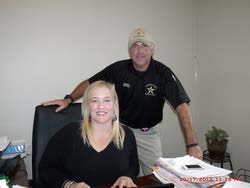Community Corrections provides option that works
Alabama state prisons are filled with 11,000 more inmates than they were designed to contain, which has pushed the prison crowding issue to the forefront of state politics.
The go-to solution for many lawmakers has been to build more prisons to sustain the growing number of prisoners.
However, one program, Community Corrections in Randolph County, has a different approach for mitigating the problem. Rebecca Farmer, the Randolph County coordinator for Community Corrections since its inception, said she believes that the only way to truly solve the prison population problem is to reduce recidivism.
Currently, 45 of the 67 counties in Alabama have a Community Corrections program, including Randolph County, which incorporated the program in 2013.
Community Corrections first came to Alabama in 1991. It’s a program designed to rehabilitate and reconnect convicted adults and adjudicated juveniles, and according to Mrs. Farmer, it’s been successful. “When I look over the results, it has been a great program for our county,” she said.

To be eligible for the program, the convicted party must be a non-violent offender. Many of the participants have been convicted of crimes such as DUIs and drug possession. Interested non-violent offenders then make a request to join the program, which Farmer’s office then processes.
One of the major benefits of the Community Corrections Program is that it saves prison beds for more dangerous criminals and gives less serious offenders a chance to fix their ways. In 2005 alone, the Alabama Department of Corrections took in about 750 offenders, and released about 500 non-violent offenders on parole.
According to Farmer, about 95 percent of the program’s 62 participants are addicted to drugs. She said she believes the approach to drug rehabilitation must change. “You don’t get over things like drug addiction by just stopping the use. You recover by creating a new life where it’s easier to not use. If you don’t, then all of the factors that brought you to addiction will catch up to you,” Farmer said.
Farmer credits the community for being receptive of the program. At first, she said, some folks were skeptical because of how different the program’s philosophy was from the idea of correcting prisoners’ behavior through punishment. But eventually, skeptics became believers after the program results were seen.
Farmer makes sure the program participants go through a multi-step process. The first thing she usually asks a participant is what they wanted to be when they were young. Many respond to this question with surprise, claiming nobody has ever really wondered what their dreams were.
This small question conveys a sense of appreciation and caring toward the participant, both of which are paramount in reclaiming a sense of self-value. Additionally, this question may show a career direction the participant can travel toward.
Depending on the participant’s desired career, Farmer then refers the participant to career counseling and the local GED program.
Afterward, lessons in budgeting are offered. Money management skills are typically not taught in public high schools or in many homes. These lessons play a great role in helping participants pay their bills, another source of self-pride and reconnection. The financial literacy offered also helps participants fight off codependency, which is a huge obstacle in returning a person to a life of self-fulfillment, she explained.
Another step participants is getting out and being social. Participants typically make claims of wanting to stay home and stay out of trouble once probation begins. But, paradoxically, staying home “out of trouble” increases the likelihood of recidivism because it prevents participants from truly reconnecting to the world.
Going out to be social can be difficult because of the stigma surrounding criminals, but success can be found with time. “I want them to go to city groups, church groups, something pro-social. But it’s hard because people are so judgmental sometimes. But we still encourage them to try,” Farmer said.
A core purpose of Farmer’s program is to make participants independent, whether it’s by helping them get a driver’s license or start a career. “We’re building this life that is not worth losing,” said Farmer.
At the heart of Community Corrections is a sanctioned, concerted effort put forth by different elements in the community to show prisoners their worth. Too often, we observe vicious cycles: generational poverty, drug addiction, anxiety begetting further anxiety. But with Farmer’s work with Community Corrections, we see a cycle of investment, and the benefits that investment extends to us all.
Tags: Roanoke